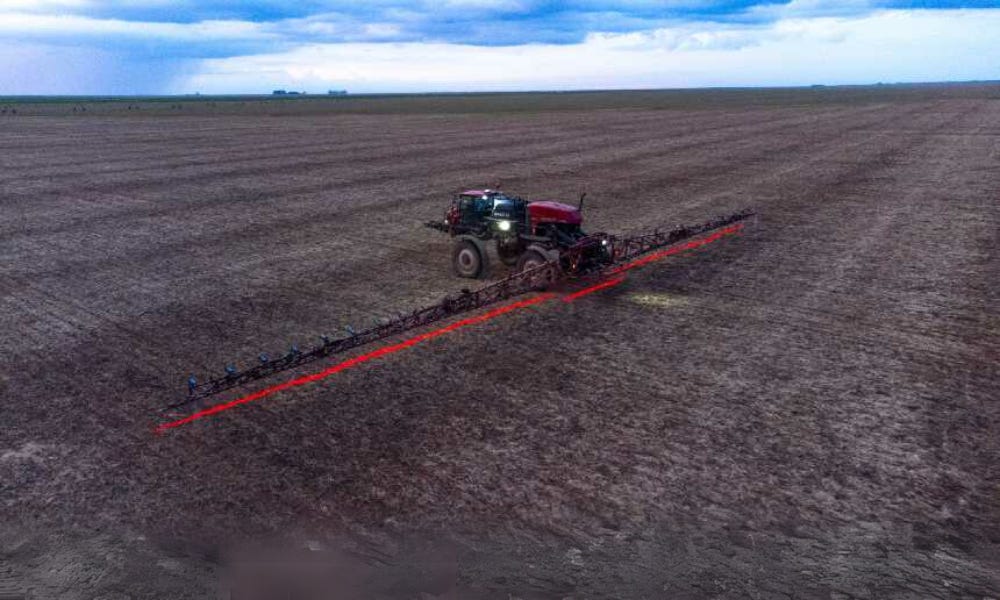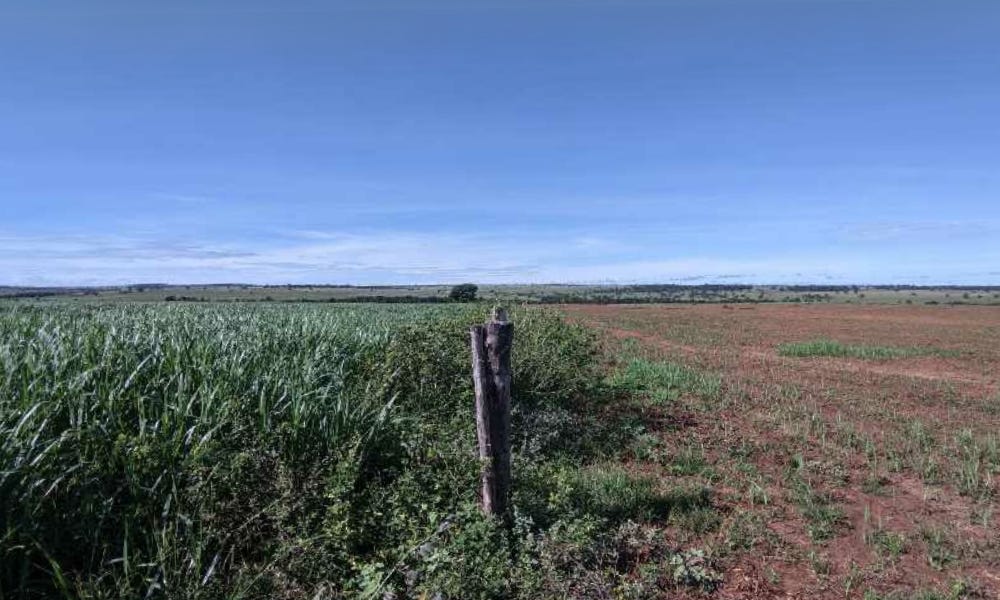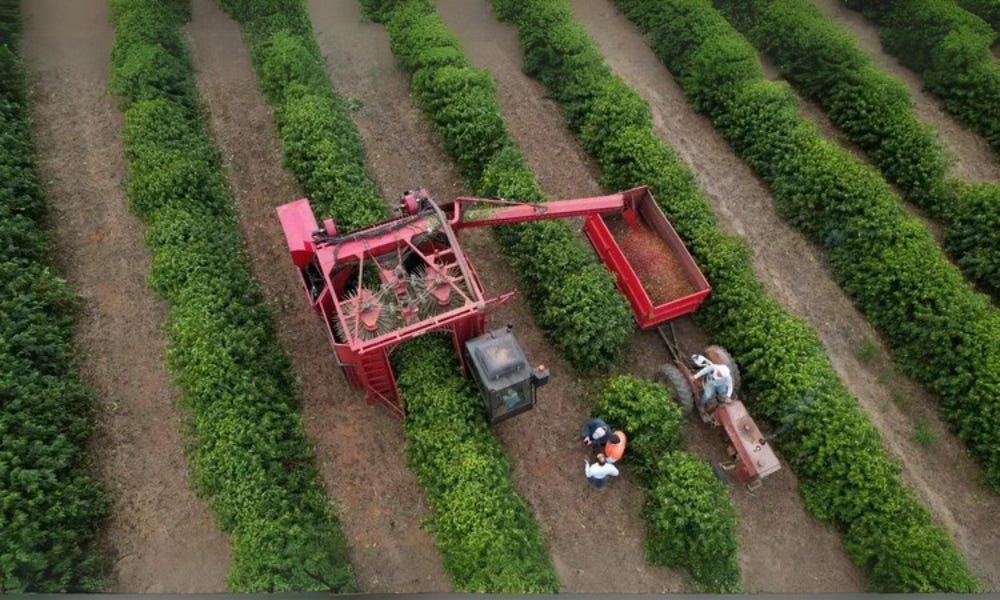Welcome to this week’s Brazil AgTech Report. Curated news from the frontline of Brazil’s AgriFood and Climate Tech ecosystem
Summary
AgTech is surging beyond the lab and into the field. From precision spraying to traceable berries, Brazil’s ag startups are scaling both revenue and impact. Smart Sensing, the Brazilian arm of Dutch firm Weed-IT, now generates over US$18 million annually by offering spraying as a service to small and mid-sized farmers. CerradoX, a specialyty crop venture, is targeting US$2 million this year by scaling its vertical platform for berries. Meanwhile, Embrapa is democratizing fruit quality control with a handheld sensor and soil control with AI-driven soil scanners. Creditares is blending fintech with boots-on-the-ground underwriting through its US$30 million rural credit FIDC.
Climate tech is going local, with soil at the center. Naturall Carbon issued the Americas’ first regen ag credits, launching a pilot in Mato Grosso do Sul and planning to scale to 150,000 hectares. Folia and Traive launched a fund to finance bioinput adoption with checks starting at US$2 million—backed by IFC. Petrobras is testing microalgae as a fertilizer input, while Corteva projects Brazil’s bioinput market will reach US$8 billion by 2030. AgBiTech, which already books 70% of sales from Latin America, plans to localize production in Brazil. And a new study by Itaú BBA and Embrapa estimates that converting degraded pasture to soy will require over US$90 billion in financing by 2030.
M&A is heating back up. After years of legal limbo, Eldorado Brasil is back on the move following the resolution of its ownership dispute. J&F Investimentos, controlled by the Batista family of JBS, retained full ownership after Paper Excellence dropped its lawsuit, clearing the way for new biomass and logistics deals. Meanwhile, global broker Marex agreed to acquire Brazil’s Agrinvest Commodities, adding 600+ clients across Brazil’s grain and sugar markets as it expands deeper into Latin America.
Macro trends point to growth—with volatility. The government’s move to end the LCA tax exemption could rattle rural credit markets, as investors weigh higher tax exposure. John Deere now expects to sell more farm machines in Brazil than in all of Europe, and Yara is rethinking coffee harvests through its new partnership with Cooxupé. Demand for specialty fertilizers is growing fast, as Brazil pivots to more efficient nutrient use. Kraft Heinz sees Brazil as a global growth engine, and a new US$57 million fund will support Embrapa-led ag research into bioinputs and soil restoration.
🧭 Table of Contents
AgTech
🍓 From Credit to Berries
🛰️ Smart Spraying Takes Off
🔬 Embrapa’s Fruit Sensor
🤖 Laser Scans Soil with AI
🐮 iBoi Gets Spun Off
💳 Creditares Funds the Field
Climate Tech
🌱 First Regen Carbon Credits
💸 Bioinput Fund Lands IFC
🌾 Pasture-to-Soy Costs Surge
🧫 Petrobras Pushes Microalgae
🧪 Corteva’s $8B Bio Bet
🦠 AgBiTech Eyes Brazil
M&A
📦 Eldorado Back in the Game
🌾 Marex Acquires Agrinvest Commodities
Macro & Markets
🚫 End of LCA Tax Break
🚜 Deere Brazil to Outpace Europe
☕ Yara Reboots Coffee Harvest
📈 Specialty Fertilizers Climb
🥫 Kraft Heinz Bets on Brazil
🔬 R$300M Ag Research Fund
🌱 AgTech
🍓 From Credit to Berries
João Paulo Torres, ex-CEO and co-founder of TerraMagna, has launched CerradoX, a startup focused on transforming the business model for highvalue crops such as blueberries, raspberries, and golden berries. He co-founded the venture with Fernando Franco, who previously co-founded edfintech Provi, acquired by Principia in 2023. CerradoX hopes to provide farmers with a vertical tech platform that combines inputs, including best in class genetics, technical support, financing and market access to smallholders converting degraded pastures into high-value berry production. The company posted revenues of US$600,000 in 2024 and is targeting US$2 million in 2025, with rising margins. read more
🛰️ Smart Spraying Takes Off
Smart Sensing, the Brazilian representative of Dutch agtech Weed-IT, is rapidly expanding its precision spraying service model across the country. With annual revenues of over US$18 million, the company is gaining strong traction with small and medium-sized farmers by offering on-demand spraying using drones and ground vehicles. Instead of selling equipment, Smart Sensing provides spraying as a contracted service—making advanced application tech more accessible and affordable. The company already operates across multiple states and has covered more than 300,000 hectares. read more
🔬 Embrapa’s Fruit Sensor
Brazil’s ag research agency Embrapa has developed a portable sensor, called Yva, that measures fruit ripeness without damaging the produce. The device uses light absorption to estimate sugar content (Brix index), helping farmers identify the ideal harvest window for mangoes, papayas, and guavas. The sensor aims to improve pricing, reduce post-harvest losses, and extend shelf life—key factors for both domestic and export markets. Field trials indicate greater accuracy and consistency compared to traditional manual assessments. read more
🤖 Laser Scans Soil with AI
Embrapa has also developed a laser-based soil analysis system that uses artificial intelligence and spectroscopy to measure soil properties in real time—eliminating the need for lab-based testing. The device can detect key physical and chemical traits such as organic matter, texture, and nutrient content within minutes. Designed for portability and scalability, it aims to reduce costs and make precision diagnostics more accessible, especially for small and mid-sized farms. Pilot programs are underway in sugarcane, coffee, and grain regions. read more
🐮 iBoi Gets Spun Off
Up2Tech is spinning off its digital livestock tracking solution iBoi into a standalone company. Already monitoring over 1 million head of cattle, iBoi uses Bluetooth-enabled ear tags and an integrated app to deliver geolocation, health, and productivity data to ranchers. The platform is gaining traction among midsize producers and cooperatives seeking better traceability for compliance and export demands. With beef supply chains under increasing pressure to verify deforestation-free and animal welfare practices, iBoi is well-positioned to scale. The spinout will focus on deepening analytics and forging fintech and insurtech integrations. read more
💳 Creditares Funds the Field
Agfintech, Creditares, is bringing credit closer to the farm gate with its new US$28M FIDC (structured credit fund). The firm deploys a network of trained “agro bankers” who operate directly in farming regions, assessing credit risk and onboarding clients with boots-on-the-ground precision. This model addresses one of agfintech’s core friction points: reliable credit origination. The fund will finance working capital loans and crop-based receivables, with plans to scale across grain and specialty crop zones. read more

🌎 Climate Tech
🌱 First Regen Carbon Credits
Naturall Carbon, an Anglo-Brazilian startup, has issued the first regenerative agriculture carbon credits in the Americas based on verified soil practices. The credits are tied to a pilot project in Mato Grosso do Sul, which validated carbon sequestration methods in real farming conditions. The company now aims to scale the project to 150,000 hectares over three years, with the potential to retain up to 300,000 tons of CO₂ per year. This marks a shift from theoretical baselines to measurable climate outcomes. read more
💸 Bioinput Fund Lands IFC
Folia and Traive have launched a dedicated investment fund to scale bioinput adoption in Brazil, with backing from the International Finance Corporation (IFC). The fund will finance bioinput companies of all sizes with check sizes starting at US$2 million, and the first disbursements are expected by September 2025. With Brazil’s bioinputs market projected to grow 13% annually through 2028, the initiative aims to address both financing gaps and regulatory uncertainty. read more
🌾 Pasture-to-Soy Costs Surge
A new study by Itaú BBA, based on data from Embrapa, estimates that converting Brazil’s degraded pasture into productive soybean cropland could require more than US$90 billion by 2030. The transition is key to unlocking yield and climate gains without expanding deforestation. However, the estimated restoration costs—driven by soil correction, equipment, and logistics—pose a major barrier for small and medium-sized farmers. The findings highlight the need for targeted credit and blended finance to accelerate land recovery at scale. read more
🧫 Petrobras Pushes Microalgae
State oil company, Petrobras, is restarting fertilizer production at its Araucária Nitrogen plant and investing in microalgae research to transform CO₂ and nutrients into sustainable agricultural inputs. The initiative is part of a broader industrial decarbonization effort and could create a new input category for Brazil’s massive ag sector. Early pilots are exploring closed-loop nutrient cycling with algae biomass. If successful, it could integrate oil-and-gas infrastructure with regenerative ag pathways. read more
🧪 Corteva’s $8B Bio Bet
Corteva Agriscience projects that Brazil’s agricultural biologicals market will reach US$8 billion by 2030, up from less than US$2 billion today. The company says Brazil already represents 25% of its global bio revenue, driven by new demand in corn, soy, and sugarcane. With tighter ESG reporting, pesticide restrictions, and global retailer pressure, the bioinput category is seeing rapid mainstreaming. read more
🦠 AgBiTech Eyes Brazil
AgBiTech, an Australian biopesticide company specializing in virus-based caterpillar control, is targeting Brazil for its next production facility. Despite having all current manufacturing in the U.S., 70% of the company’s sales are in Latin America, where it also concentrates 140 of its 180 employees. The planned Brazilian plant would localize production and reduce costs in its largest market. AgBiTech’s products use baculoviruses to eliminate pests without harming beneficial insects, offering a sustainable alternative to chemical pesticides. Rising demand from soy and cotton producers, combined with improving local regulations, is driving the expansion push. read more

🔄 M&A
📦 Eldorado Back in the Game
Eldorado Brasil, one of Brazil’s largest pulp producers, is preparing to reenter the M&A market following the resolution of a long-running ownership dispute. In May, Paper Excellence agreed to drop its lawsuit against J&F Investimentos, allowing J&F—the holding company of the Batista family, which also controls JBS—to retain full ownership of Eldorado. The dispute stemmed from a 2017 deal that ultimately fell through. With control clarified, J&F plans to resume Eldorado’s expansion strategy in pulp, biomass, and logistics. read more
🌾 Marex Acquires Agrinvest Commodities
Global commodities broker Marex has agreed to acquire Agrinvest Commodities, a prominent Brazilian grain and sugar brokerage, to strengthen its footprint in Latin America. Agrinvest brings a portfolio of more than 600 clients, including producers and cooperatives, and a strong track record in market analysis and risk management. The deal reflects growing global interest in Brazil’s commodity infrastructure and data-driven commercial platforms. read more
💼 Macro & Markets
🚫 End of LCA Tax Break
Brazil’s federal government has ended the income tax exemption on LCAs (Letras de Crédito do Agronegócio), a decision that could significantly impact the country’s rural credit system. LCAs currently account for an estimated 35% of all rural credit, fueled by billions in tax-exempt institutional investment. Without this incentive, analysts warn that demand could decline, raising borrowing costs for farmers and tightening credit availability during key planting seasons. The measure is part of the broader tax reform agenda and is expected to take effect in the second half of 2025. read more
🚜 Deere Brazil to Outpace Europe
John Deere expects its agricultural machinery sales in Brazil to surpass those in all of Europe in 2025—a first for the company. Strong demand from the country’s sugarcane, cotton, and grain sectors is driving the growth, along with rising adoption of connected equipment and precision agriculture tools. The company also credits supportive financing programs and higher commodity prices for boosting equipment investment. read more
☕ Yara Reboots Coffee Harvest
Yara has partnered with Cooxupé, the world’s largest coffee cooperative, to pilot a new harvest management system for the 2025 crop. The program combines customized plant nutrition plans, climate-smart tools, and digital advisory to improve yield and quality. It’s part of Yara’s effort to deepen relationships with high-value specialty crops and align with ESG targets around low-carbon coffee production. Cooxupé represents over 17,000 producers in Minas Gerais and São Paulo, offering a testbed for scaling sustainable input strategies. read more
📈 Specialty Fertilizers Climb
Brazil’s demand for specialty fertilizers—including slow-release and enhanced-efficiency formulations—is rising quickly. Driven by sustainability targets and export market pressure, farmers are shifting toward products that improve nutrient use while reducing environmental impact. Global suppliers are ramping up production, and local firms are entering with precision formulations tailored to key crops like soy, fruit, and vegetables. Experts say specialty products could account for 25% of Brazil’s fertilizer market within the decade. read more
🥫 Kraft Heinz Bets on Brazil
Kraft Heinz sees Brazil’s agricultural sector as a strategic growth engine. According to the company’s LatAm president, rising domestic productivity, innovation in raw material sourcing, and consumer market growth are positioning Brazil as a key hub in its global supply chain. The company is expanding partnerships with local coops, investing in packaging R&D, and ramping up its ESG-aligned product portfolio. It’s also reshaping procurement to integrate regional suppliers into its global network, reducing costs and emissions. read more
🔬 R$300M Ag Research Fund
Brazil has launched a new US$60 million fund focused on applied research in sustainable agriculture. Managed by Embrapa and financed through public and private contributions, the fund will target priority areas including soil recovery, biological inputs, and low-carbon production systems. First calls for proposals are expected later this year. The initiative aims to bridge the gap between lab-scale innovation and scalable on-farm solutions—especially in frontier regions where adoption barriers remain high. read more

That’s all for this week, thanks for reading,
KFG 🚀
Kieran Finbar Gartlan is an Irish native with over 30 years of experience living and working in Brazil. He is Managing Partner at The Yield Lab Latam, a leading venture capital firm investing in Agrifood and Climate Tech startups across Latin America.
🧠 New! Paid subscribers now get access to “My Take” — a brief commentary tying together this week’s key trends, offering insight and perspective on what it all means for Brazil’s ag and climate tech opportunity.




